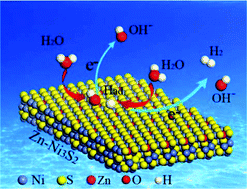Designing Zn-doped nickel sulfide catalysts with an optimized electronic structure for enhanced hydrogen evolution reaction†
Abstract
Designing non-noble-metal electrocatalysts with excellent performance and economic benefits toward the hydrogen evolution reaction (HER) is extremely crucial for future energy development. In particular, the rational cationic-doped strategy can effectively tailor the electronic structure of the catalysts and improve the free energy of the adsorbed intermediate, thus enhancing HER performance. Herein we reported Zn-doped Ni3S2 nanosheet arrays supported on Ni foam (Zn-Ni3S2/NF) that were synthesized by a two-step hydrothermal process for improving HER catalysis under alkaline conditions. Remarkably, the obtained Zn-Ni3S2/NF displays excellent HER catalytic performance with an overpotential of 78 mV to reach a current density of 10 mA cm−2 and dramatic long-term stability for 18 h in 1 M KOH. In addition, the results based on the density functional theory calculations reveal that Zn dopants can modulate the electronic structure of Ni3S2 and optimize the hydrogen adsorption free energy (ΔGH*). Thus cationic-doping engineering provides an efficient method to enhance the intrinsic activities of transition-metal sulfides, which may contribute to the development of nonprecious electrocatalysts for HER.



 Please wait while we load your content...
Please wait while we load your content...